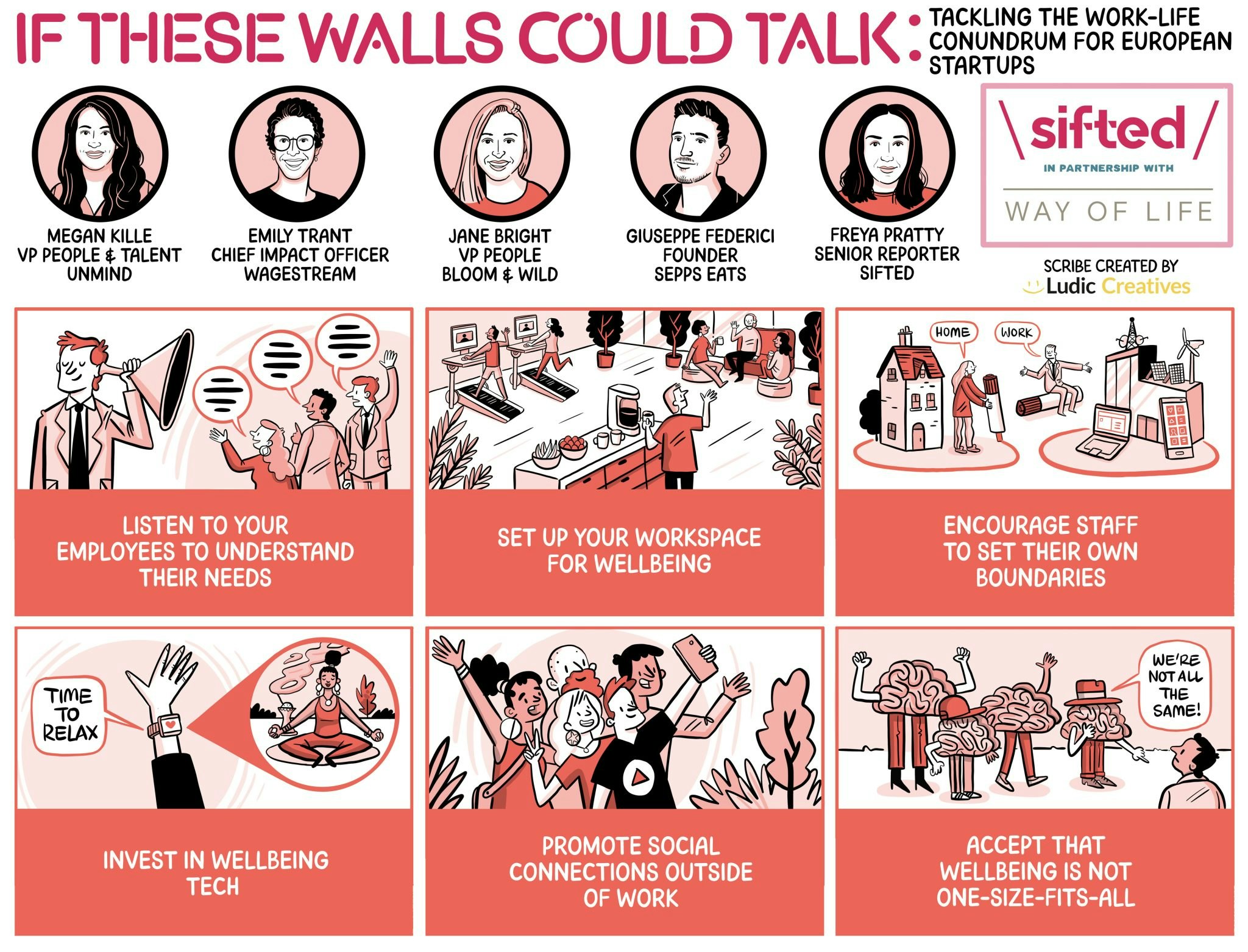Balance means something different to everyone, especially when it comes to the much-discussed work-life balance that appears in job postings everywhere. But in a startup, where every decision feels critical, how can founders keep their teams happy while maintaining a balanced workload?
In this edition of our first ever in-person Sifted Talks, a panel of business leaders known for prioritising workplace wellness, tackled exactly that. Hosted in living and working space Riverstone Heights in east London, the discussion focused on how to foster open conversations with your team for genuine insights, how to find the right workspace and what work-life balance really means.
The speakers were:
- Megan Kille, VP of people and talent at workplace wellbeing platform Unmind
- Emily Trant, chief impact officer at Wagestream, a financial wellbeing platform
- Giuseppe Federici, founder of Sepps Eats, a social media and food business
- Jane Bright, VP of people at Bloom & Wild, Europe’s leading flower-delivery company
Here are the key takeaways from the panel discussion:

1/ Listen to your employees to understand their needs
The panel kicked off by addressing how startups can better understand employees' workplace needs.
Kille from Unmind shared that the nature of her company means it must practise what it preaches. One example is their introduction of monthly "Revive and Thrive" days for employee mental health. “We needed to take a bolder approach with our strategy and enable staff to say ‘no’ to things,” she said.
Bright explained that at Bloom & Wild, a key challenge is understanding the needs of 400+ employees — from warehouses to head offices and home offices. The plan? Hire strong managers, develop an "employee listening strategy" and ensure open communication at all levels.
Next, Wagestream’s Trant highlighted the importance of addressing financial wellbeing, not just employee pay, but how staff manage their finances.
"I want to leave you with one number: 13. That's the cost of financial stress — not in pounds or time off work, but in IQ points. When you're financially stressed, it can lower your IQ, potentially dropping you from average intelligence to borderline deficient." — Emily Trant, Wagestream
2/ Set up your workspace for wellbeing
The panel then explored how startups can create workspaces that enhance wellbeing.
Federici, founder of Sepps Eats, said his workspace serves multiple purposes — office, home and studio. He emphasised the need to optimise work environments for maximum productivity.
Kille agreed, recounting how Unmind had to rethink their approach to in-person work after growing rapidly during the pandemic.
"We have a beautiful office space in London Bridge, designed for productivity and wellbeing. However, we have a work-from-anywhere policy, so people are encouraged to come to the office with their team one day each week." — Megan Kille, Unmind
3/ Encourage staff to set their own boundaries
The conversation shifted to the importance of setting boundaries to maintain work-life balance.
Bright pointed out the need for leaders to set an example. Bloom & Wild’s executives have open diaries that showcase personal activities like exercise or family time. One C-suite member even includes in his email signature: “Replies should be sent at the recipient’s convenience.”
Federici also advocated for better smartphone etiquette, sharing how he uses tools like the iPhone’s built-in app to limit screen time after hours.
“I’ve used tools like the built-in app on an iPhone, which stops you from using it after a certain time. It makes it a little harder to just mindlessly scroll.” — Giuseppe Federici, Sepps Eats
4/ Invest in wellbeing tech
The panel discussed how a strong focus on staff wellbeing can have a direct impact on success.
At Unmind, despite having various wellbeing initiatives, Kille noted that their wellbeing app had the most impact. The app provides staff with access to training, content and development courses, all aimed at improving mental health. Kille said a data-driven approach is key to meaningful change.
To that end, Unmind recently launched Nova, an AI therapy coach that offers 24/7 support for employees. Kille pointed out that investing in wellbeing goes beyond just doing the right thing — there's a business case for it.
"If people's mental health is up, generally business is up. They don't have to worry about other things they've got to worry about." — Kille
5/ Promote social connections outside of work
The pandemic has changed how Bloom & Wild approaches social connections, Bright said.
The company now focuses on "deep-connection moments" rather than regular events. Perks like Fridays off in summer are to show appreciation for the team's hard work during busier periods.
“We’ve slowed things down from a connection perspective. Pre-Covid, we used to be together every day — running clubs, book clubs and hosting events in the office. Now, with fewer people in the office, we focus on a few deep connection moments per year, like our summer and winter parties or the boat trip." — Jane Bright, Bloom & Wild
6/ Accept that wellbeing is not one-size-fits-all
The panel wrapped up with advice on how to create a work-life balance tailored to the individual.
Kille said a one-size-fits-all approach fits no one. One successful initiative is that Unmind now allows employees to take bank holidays like Christmas whenever it suits them, recognising that not everyone feels the same way about all holidays.
For Bright, a good tip is recognising the importance of ensuring that what’s promised to employees matches their actual experience in the company: “Be transparent about what you're offering when hiring."
Finally, Trant concluded that productivity isn’t constant throughout the day. Recognising this can help employees work more effectively in ways that suit their personal rhythm.
"Thinking time is still work. You don’t need to feel guilty about not staring at a screen while you’re processing ideas. It should feel okay to step outside, go for a walk or take a break when you're stuck — it’s part of the work too." — Trant
To learn more about Riverstone Heights and maintaining achieving a work-life balance — particularly in busy London — read our previous Sifted article here.




